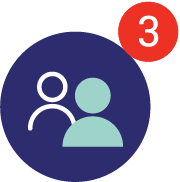The role of the local authority is to bring together all stakeholders around the urban data for better urban planning and programming of public investments.
There are numerous possibilities inherent to digital tools for gaining more detailed knowledge on the territory. Municipalities can thereby organise and develop their own urban data collection to improve, for example, management of the land registry map and knowledge of urban vulnerabilities.
In a complementary manner, civil society stakeholders (inhabitants, NGOs and universities) also mobilise digital tools to “put on the map” the vulnerable neighbourhoods and urban challenges they face. This process can be part of a rationale of social protest or of capacity building to combat urban eviction.
| Local authority | Possesses statistics databases Wishes to follow urban expansion and find out the potential for urban densification Lack of detailed knowledge on urban development on the periphery Wants to improve emergency response capacity |
| Traditional private firms | Can take advantage of knowledge to extend their markets Interest in better knowledge of possible business areas |
| Start-up | Can integrate and exploit the data Work collaboratively and participatively Are capable of updating and working responsively |
| Universities | Can integrate, put into form and exploit data Possess databases |
| NGO | Play the role of intermediary between population and authorities Train the population on producing data |
| Population | Wish to have an objective medium for balanced dialogue with public authorities Contribute via crowdsourcing Crowdsourcing Consists in the use of information, creativity, expertise or intelligence of a large number of people through the intermediary of a platform. From an economic approach, it may be a question of distributing a large number of tasks for the lowest cost. From a collaborative, social or altruistic approach, it is a question of making use of the specialist or volunteer networks of the general public to collect or process information. to generating knowledge |


 Clarify expectations about digitalization of urban and spatial planning
Clarify expectations about digitalization of urban and spatial planning Perform a self-diagnosis of available and usable data for planning and crisis and disaster management
Perform a self-diagnosis of available and usable data for planning and crisis and disaster management Identify the partners and ecosystem capable of producing urban data
Identify the partners and ecosystem capable of producing urban data Start with pilot actions to test simple solutions
Start with pilot actions to test simple solutions Define a roadmap to ensure public responsibility for urban planning data
Define a roadmap to ensure public responsibility for urban planning data Assess, learn and enrich the data for territorial knowledge, and communicate on possible contributions
Assess, learn and enrich the data for territorial knowledge, and communicate on possible contributions
